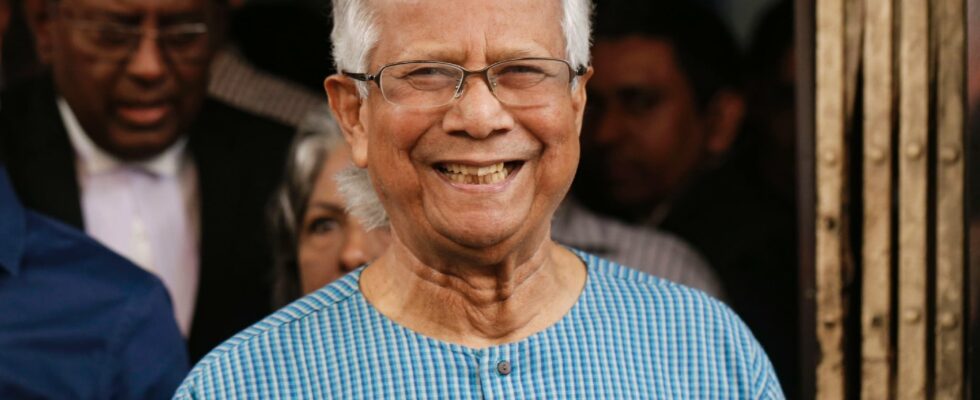“I am looking forward to coming home, seeing what is happening and how we can organize ourselves to get out of the problems we are in,” Nobel Peace Prize winner Muhammad Yunus told reporters on Wednesday, August 7, upon arriving at Roissy Charles-de-Gaulle airport. The 84-year-old economist will lead an interim government in Bangladesh, where bloodily suppressed protests have been taking place since early July. He boarded a flight to Dubai, where he will stop over before arriving in Bangladesh, the country he left in early 2024 after being sentenced to six months in prison for violating labor laws, charges he denies.
Call to “rebuild the country”
Muhammad Yunus called on his fellow citizens to remain “calm” after more than a month of protests, particularly by students, against quotas for recruitment in the civil service, which have left at least 432 dead, according to an AFP report. “I am launching a vibrant appeal to everyone to remain calm. I ask you to refrain from any form of violence,” he said in a statement on the eve of his return and after the flight of the resigning Prime Minister Sheikh Hasina. “Be calm and ready to rebuild the country. If we take the path of violence, everything will be destroyed,” added the economist, who also “congratulated the courageous students” and “the people for giving them their full support.”
Known for lifting millions out of poverty through his pioneering microfinance bank, the popular Muhammad Yunus has drawn the persistent enmity of Prime Minister Sheikh Hasina, who has accused him of “sucking the blood” of the poor. Returned to power in 2009, she won a fifth term in January in an election without any real opposition. The protests began in early July after Hasina’s government reintroduced a system reserving nearly a third of civil service jobs for descendants of war veterans, and has been accused by human rights groups of using institutions to entrench its grip and stamp out dissent.
Elections “in the coming months”
If Muhammad Yunus said he was satisfied, in the British magazine The Economist Tuesday, the government’s resignation and subsequent flight of Prime Minister Sheikh Hasina due to the protests, he deplored “the loss of over 300 lives in state-sanctioned violence against peaceful protesters and bystanders.” To ensure “these lives were not lost in vain,” he wrote, the next step would be to “ensure free and fair elections in the next few months.” “We urgently need new politicians and new leaders,” he insisted, adding that young people “must not be obsessed with settling scores, as too many of our previous governments have been.”
Tarique Rahman, interim president of the Bangladesh Nationalist Party (BNP), the main opposition movement to Sheikh Hasina, also called for elections to be held “as soon as possible”, during a video address to a huge crowd in Dhaka, and from the London exile he took under Sheikh Hasina’s mandate.
An interim government decided by the president
The decision “to form an interim government […] with Yunus as leader” was taken during a meeting between President Mohammed Shahabuddin, senior army officials and leaders of the Students Against Discrimination group, the main movement behind the protests that began in early July, according to a statement from the Bangladeshi presidency on Wednesday.
Nahid Islam, leader of the student group that attended the meeting with the head of state, said the Nobel laureate would be given the title of chief adviser. President Shahabuddin dissolved parliament on Tuesday, as demanded by the protesting students and the BNP. On Monday, he ordered the release of those arrested during the protests and political prisoners, including Michael Chakma, an indigenous activist who has been incarcerated in a secret prison since 2019, his party, the United People’s Democratic Front, said on Wednesday. The head of the national police was dismissed by President Shahabuddin and the army has carried out several reshuffles among its senior officers, including demoting some of them considered close to Sheikh Hasina.
Monday was the deadliest day since the start of the movement, with at least 122 deaths in 24 hours. For Thomas Kean, of the International Crisis Group think tank, the new authorities now face a formidable challenge: that of “rebuilding democracy in Bangladesh, which has been seriously damaged in recent years”.
